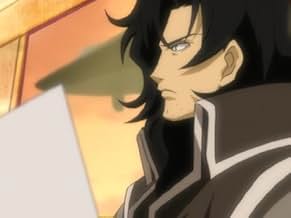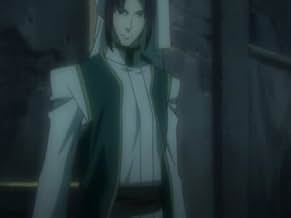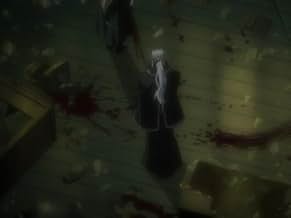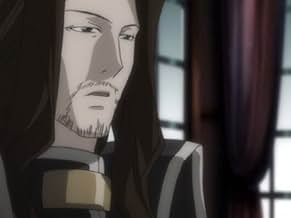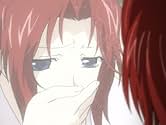In a futuristic world of an unsteady truce between humans and vampires a superhuman priest battles to secure a peaceful co-existence.In a futuristic world of an unsteady truce between humans and vampires a superhuman priest battles to secure a peaceful co-existence.In a futuristic world of an unsteady truce between humans and vampires a superhuman priest battles to secure a peaceful co-existence.
Browse episodes
Storyline
Did you know
- TriviaThe title "Trinity Blood" obviously alludes to the three blood strains featured in the series: Terrans (humans), Methuselahs (vampires) and Crusniks (über-vampires).
However, it also hints at the three Crusniks holding positions in different associations: Abel Nightroad - the Vatican (AX division); Cain Nightroad - the Rosenkreuz Orden; and Seth Nightroad - the Methuselah Empire.
Finally, it refers to the three major kingdoms in the series: the Vatican, the Methuselah Empire and the Kingdom of Albion.
- ConnectionsEdited into Trinity Blood: Genesis (2006)
- SoundtracksDress
(Bloody Trinity Mix)
Composed and Sung by Buck-Tick
Musical arrangement by Hidehiko Hoshino
Lyrics by Atsushi Sakurai
Featured review
The level of perfection Trinity Blood evokes can only be described as breathless. I have watched many different anime and this show has reached a pinnacle of beauty which I have not seen in others. It is much like a moving painting, so rich with color and vibrancy, and the seamless integration of both CGI and single-cell animation makes it a technological tour worth taking.
What fascinates me the most by Japanese animation is the reoccurring motif of machine vs. human and spirituality vs. society. Both of these conflicts are seriously considered in Trinity Blood without the actual plot and characters being bogged down. Also, one must consider the various aesthetic differences between U.S. culture and Japan. I don't think finality is considered an important aspect for completion in Japanese culture. The story must go on, and nothing really ends. (Although it appears the author of the manga died before the completion of the story, which explains why their is a wanting for more closure.)
I personally don't like to be patronized when I watch a film. There is something much more mysterious and fascinating to be able to watch the characters develop without a whole lot of unnecessary exposition. I think Trinity Blood deserves repeated viewings in order to truly appreciate the plot it weaves. Even the smallest characters are treated with the utmost importance, and yes, even I want to see more. But is that really a bad thing?
What fascinates me the most by Japanese animation is the reoccurring motif of machine vs. human and spirituality vs. society. Both of these conflicts are seriously considered in Trinity Blood without the actual plot and characters being bogged down. Also, one must consider the various aesthetic differences between U.S. culture and Japan. I don't think finality is considered an important aspect for completion in Japanese culture. The story must go on, and nothing really ends. (Although it appears the author of the manga died before the completion of the story, which explains why their is a wanting for more closure.)
I personally don't like to be patronized when I watch a film. There is something much more mysterious and fascinating to be able to watch the characters develop without a whole lot of unnecessary exposition. I think Trinity Blood deserves repeated viewings in order to truly appreciate the plot it weaves. Even the smallest characters are treated with the utmost importance, and yes, even I want to see more. But is that really a bad thing?
- BlueFire-2
- Sep 3, 2007
- Permalink
- How many seasons does Trinity Blood have?Powered by Alexa
Details
- Color
- Aspect ratio
- 1.78 : 1
Contribute to this page
Suggest an edit or add missing content








